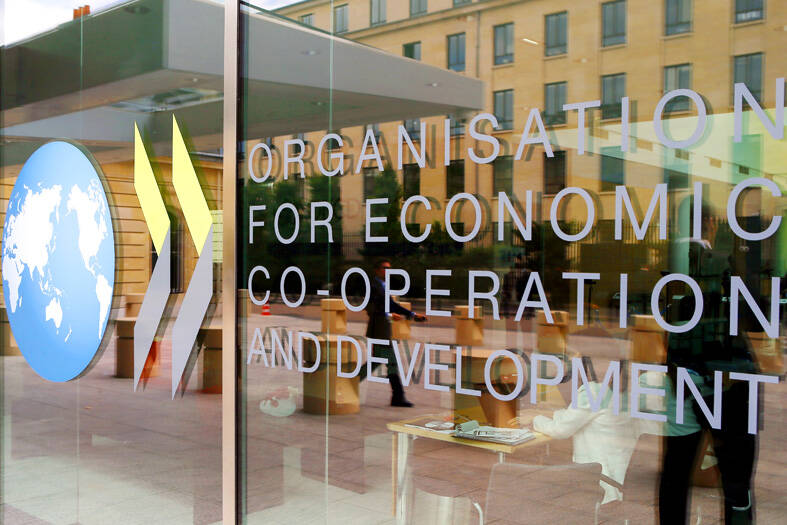World economic growth is slowing due to decades-high inflation, the Organisation for Economic Co-operation and Development (OECD) said yesterday, calling for “essential” further monetary policy tightening and “more targeted” government support.
Global GDP is set to grow 3.1 percent this year — nearly half the rate for last year, the OECD said.
The slide is due to continue next year, with global growth falling to 2.2 percent before rebounding “to a relatively modest 2.7 percent in 2024,” the Paris-based organization said.

Photo: AP
Amid the effects of Russia’s invasion of Ukraine, “growth has lost momentum, high inflation is proving persistent, confidence has weakened, and uncertainty is high,” it said in its latest forecasts.
OECD chief economist Alvaro Santos Pereira said the global economy was “reeling from the largest energy crisis since the 1970s.”
The energy shock has pushed inflation up “to levels not seen for many decades” and is hitting economic growth around the world, he added.
Inflation had already been on the rise before the conflict due to bottlenecks in the global supply chain after countries emerged from COVID-19 lockdowns.
However, the OECD said that inflation was set to reach 8 percent in the fourth quarter of this year in the G20 top economies, before falling to 5.5 percent next year and in 2024.
In a positive sign, several factors driving inflation have eased in the past year.
Supply chains that were disrupted during the pandemic have been restored and maritime freight costs that had spiked have fallen back.
“Our central scenario is not a global recession, but a significant growth slowdown for the world economy in 2023, as well as still high, albeit declining, inflation in many countries,” Santos Pereira said.
Fighting inflation is a “top policy priority,” the OECD said, as soaring prices erode people’s purchasing power worldwide.
It recommended tightening monetary policy in countries where price rises remained high, and targeted support for families and firms to avoid exacerbating inflationary pressures, with energy costs “likely to remain high and volatile for some time.”
“In these difficult and uncertain times, policy has once again a crucial role to play: Further tightening of monetary policy is essential to fight inflation, and fiscal policy support should become more targeted and temporary,” the OECD said.
The 38-member group called for an acceleration in investment in adopting and developing clean energy sources and technology to help diversify supply.
Gas and oil deliveries from major producer Russia have been severely disrupted following its invasion of Ukraine. Western allies sanctioned its energy exports and Russia slashed supplies in the stand-off over the conflict.
The upheaval has sent energy costs spiraling and fueled decades-high inflation in major economies, leading central banks to hike interest rates in a bid to tame runaway prices.
However, the tighter monetary policies have stoked fears of hampered economic growth as borrowing becomes more expensive for businesses and individuals.

Semiconductor business between Taiwan and the US is a “win-win” model for both sides given the high level of complementarity, the government said yesterday responding to tariff threats from US President Donald Trump. Home to the world’s largest contract chipmaker, Taiwan Semiconductor Manufacturing Co (TSMC, 台積電), Taiwan is a key link in the global technology supply chain for companies such as Apple Inc and Nvidia Corp. Trump said on Monday he plans to impose tariffs on imported chips, pharmaceuticals and steel in an effort to get the producers to make them in the US. “Taiwan and the US semiconductor and other technology industries

SMALL AND EFFICIENT: The Chinese AI app’s initial success has spurred worries in the US that its tech giants’ massive AI spending needs re-evaluation, a market strategist said Chinese artificial intelligence (AI) start-up DeepSeek’s (深度求索) eponymous AI assistant rocketed to the top of Apple Inc’s iPhone download charts, stirring doubts in Silicon Valley about the strength of the US’ technological dominance. The app’s underlying AI model is widely seen as competitive with OpenAI and Meta Platforms Inc’s latest. Its claim that it cost much less to train and develop triggered share moves across Asia’s supply chain. Chinese tech firms linked to DeepSeek, such as Iflytek Co (科大訊飛), surged yesterday, while chipmaking tool makers like Advantest Corp slumped on the potential threat to demand for Nvidia Corp’s AI accelerators. US stock

The US Federal Reserve is expected to announce a pause in rate cuts on Wednesday, as policymakers look to continue tackling inflation under close and vocal scrutiny from US President Donald Trump. The Fed cut its key lending rate by a full percentage point in the final four months of last year and indicated it would move more cautiously going forward amid an uptick in inflation away from its long-term target of 2 percent. “I think they will do nothing, and I think they should do nothing,” Federal Reserve Bank of St Louis former president Jim Bullard said. “I think the

SUBSIDIES: The nominee for commerce secretary indicated the Trump administration wants to put its stamp on the plan, but not unravel it entirely US President Donald Trump’s pick to lead the agency in charge of a US$52 billion semiconductor subsidy program declined to give it unqualified support, raising questions about the disbursement of funds to companies like Intel Corp and Taiwan Semiconductor Manufacturing Co (台積電). “I can’t say that I can honor something I haven’t read,” Howard Lutnick, Trump’s nominee for commerce secretary, said of the binding CHIPS and Science Act awards in a confirmation hearing on Wednesday. “To the extent monies have been disbursed, I would commit to rigorously enforcing documents that have been signed by those companies to make sure we get